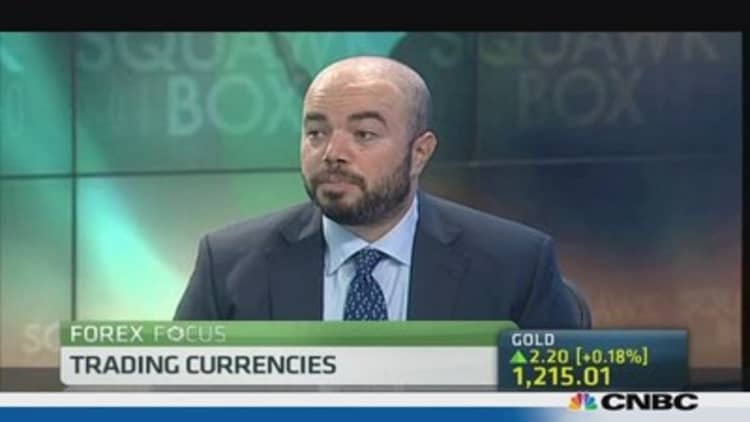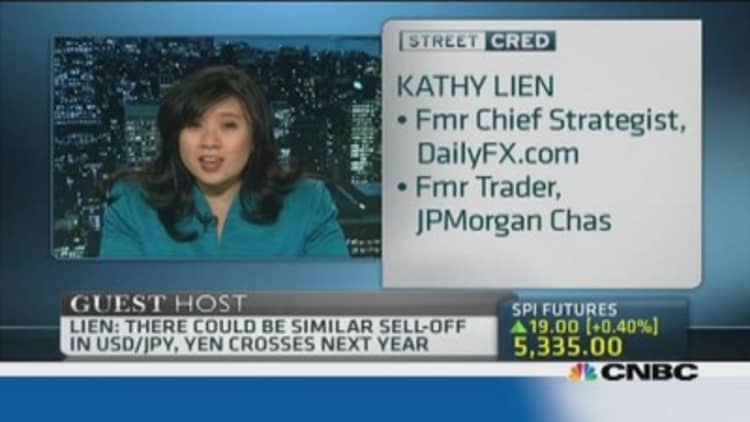
Even as the yen trades at more than five-year lows, analysts expect a resurgence of the carry trade will keep Japan's currency on a downtrend well into 2014.
"We're going to see a resurgence of the carry trade," Todd Elmer, currency strategist at Citigroup, told CNBC. "It's not going to explode like a volcano, but we do think it's going to come back," he said.
A carry trade is when investors borrow in a low yielding currency, such as the yen, to fund investments in higher yielding assets somewhere else. A weakening currency is central to the carry trade since it means that investors have less to repay when they cash out of the trade.
(Read more: Could dollar-yen hit 125 next year?)
The so-called yen carry trade was popular in 2004-2008, with the yen weakening about 20 percent against the dollar over that period, but the global financial crisis sapped demand for risk assets and sent investors scurrying into safe havens.
In recent years, the trade has been less popular as monetary easing in the U.S. and Europe kept interest rates for banks artificially low, increasing the appeal of using the dollar and the euro instead of the yen.
"Our expectation for money to flow out of the U.S. and to flow out of Japan is really more a function of the fact that policy is not going to be getting much tighter anytime soon," Elmer said.
(Read more: Buy Japan exporters on weak yen? Not so fast)
Although the Federal Reserve decided earlier this month to taper its monthly $85 billion a month in asset purchases to $75 billion starting in January, analysts don't expect an interest rate increase anytime soon. The Bank of Japan also embarked on a huge quantitative easing program in April and analysts don't expect that to be unwound for quite some time.
"The Fed is really winning the battle in terms of convincing the market that the move towards taper does not signal higher interest rates anytime soon," Elmer said.

But he added, "The big question confronting the market at this point is whether or not U.S. growth will be spectacular enough to drive a further portfolio reweighting in favor of U.S. assets." A surge in funds into U.S. assets would likely push up the U.S. dollar, and make carry trades using the greenback unprofitable.
Elmer said he doesn't expect this to happen in 2014, although he noted the development of U.S. natural resources, such as shale gas, may attract funds.
Others also expect the carry trade to keep the yen weak, but they see risks.
(Read more: Dennis Gartman: Here's my single best trade for 2014)
"While I am bullish all of the carry trades in the first quarter, there's scope for a steep reversal in the second quarter, especially since we have a significant amount of short yen positions in the books right now and there's going to be a lot of unwinds once we get a reason for people to bail out of their short yen trades," Kathy Lien, managing director of forex strategy at BK Asset Management, told CNBC.
The U.S. dollar is fetching around 105.37 yen, the greenback's highest since October 2008, while the euro is also around more than five-year highs against the Japanese currency, at 144.84 yen.
She expects the planned increase of Japan's consumption tax to 8 percent from 5 percent, set for April, will increase risks for the short-yen trade.
(Read more: HSBC strategist: Am I the last person in the world underweight Japan?)
"In the first quarter, we'll see strength on carry trades. In the second quarter, probably quite a bit of weakness -- maybe 8-10 percent lower -- and then in the third quarter, hopefully the Bank of Japan will swoop in and ride in like a white knight with some additional stimulus to stabilize the economy as well as the currency."
In a note, she said she expects the U.S. dollar to strengthen to 107 yen in the first quarter, and after correcting in the second quarter, she forecasts a rise about 108 and possibly 110 if the likely economic slowdown after the April tax hike is met with more Bank of Japan asset purchases and a corporate tax cut.
—By CNBC.Com's Leslie Shaffer; Follow her on Twitter @LeslieShaffer1


